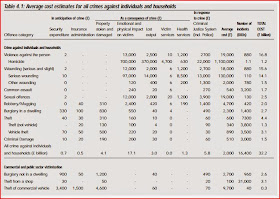But when considering crime and social class, we run into difficulties of definition with respect to crime. If the underlying principle of the common law is "do no harm", then whether by incompetence or callous negligence, far greater crimes have been committed by financial manipulators than by common criminals - and the former are not only unpunished, but continue to be unbelievably well-rewarded for it. Indeed during the emergency bailouts, some bankers got bumper bonuses because they included the bailout money as part of the turnover on which their payouts were based.
Looking at conventional crime, a Home Office study issued in 2000 estimated the total economic cost to the UK at £59.9 billion p.a (about £1,000 per head of population).:
 |
| http://webarchive.nationalarchives.gov.uk/20110218135832/rds.homeoffice.gov.uk/rds/pdfs/hors217.pdf |
 |
| http://webarchive.nationalarchives.gov.uk/20110218135832/rds.homeoffice.gov.uk/rds/pdfs/hors217.pdf |
Compare that with the IMF's 2009 estimate of the cost to the UK of the 2008 banking crisis: £1,227 billion; the equivalent of some £20,500 per man, woman and child in this country - in one year! Not to mention the £375 billion p.a. "quantitative easing" still ongoing.
We can also ask, how do we define cost? John Mortimer's fictional barrister Horace Rumpole points out that criminals make a good living for professionals like himself. GDP, employment and tax revenues (though not real net wealth) are increased by all this economic "activity". But how much prosperity and employment did the financial rescue create? Not that it is actually a rescue: I suspect that disaster has merely been deferred, and possibly exacerbated to boot.
I do not support abortion; but if I did, I should rather be looking to terminate potential bankers than potential burglars.
All original material is copyright of its author. Fair use permitted. Contact via comment. Unless indicated otherwise, all internet links accessed at time of writing. Nothing here should be taken as personal advice, financial or otherwise. No liability is accepted for third-party content, whether incorporated in or linked to this blog; or for unintentional error and inaccuracy. The blog author may have, or intend to change, a personal position in any stock or other kind of investment mentioned.
No comments:
Post a Comment
Unfortunately, because of a plague of spam comments, you need to be a "registered user", otherwise your observations will be buried in a torrent of multilingual nonsense. Please do comment!
Say what you please, so long as it's phrased politely and is not libellous or legally proscribed. Fact, reason and wit are keenly welcomed.